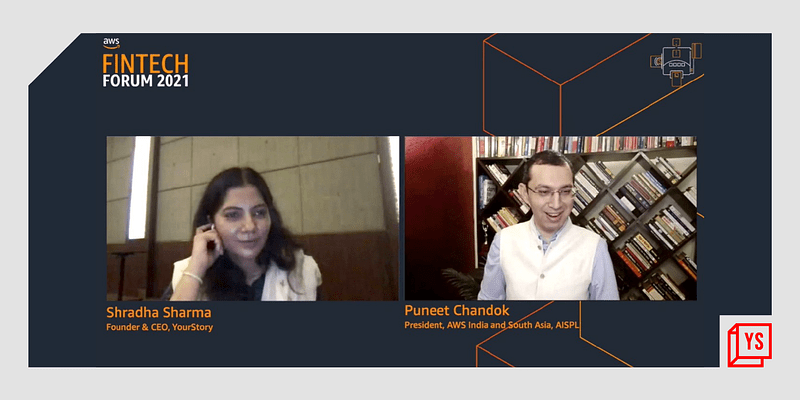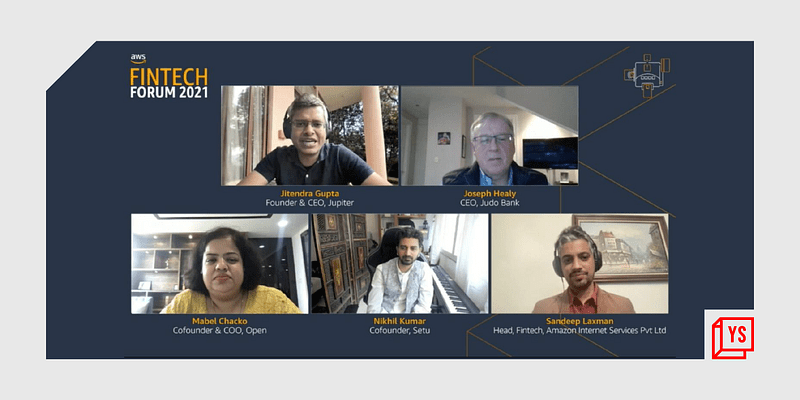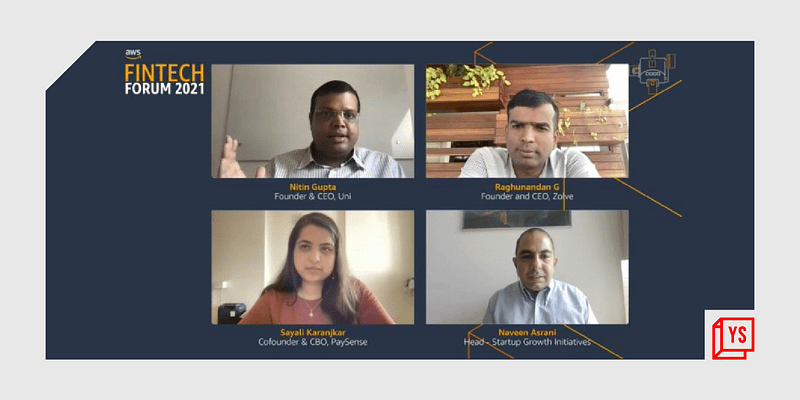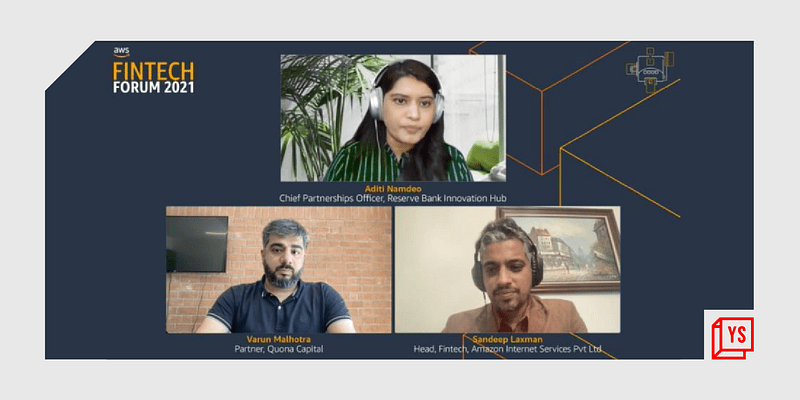“Trust arrives on the back of a tortoise and leaves on the back of a galloping horse,” said Joseph Healy, Co-founder and CEO, Judo Bank on the growing trust in the digital banking and payments sector in the last 18 months.
Joseph was speaking at a panel discussion on ‘Reimagining banking for the 21st century’ at the 5th edition of the AWS Fintech Forum held on November 25-26, 2021. Day 1 featured insightful fireside chats and panel discussions, covering everything from leading trends in the fintech space, how fintechs can grow and scale, neobanking, the path to unicorn status, and more.

Puneet Chandok, President - India and South Asia, AWS and Shradha Sharma, founder and CEO of YourStory opened the AWS Fintech Forum with a fireside chat on all things fintech, before the panel discussions for the day began.
Here is a look at some of the most relevant themes that were discussed on the first day of the forum.
Trends in neobanking
The business of banking is evolving rapidly, and neobanking is one of the most exciting and interesting spaces in the sector today. “Unlike consumer apps, banking apps lack interactivity. Customers’ expectations have evolved as they demand more interactivity, personalisation, recommendations, reviews, and ratings. They want everything in context and we are trying to address that,” said Jitendra Gupta, Founder and CEO, Jupiter on the ever-changing nature of consumer expectations, and the growing need for hyper personalisation in banking products and services.
Joseph further discussed the disconnect between banks and the communities they serve - particularly the SME sector.
Concurring with Joseph, Mabel Chacko, Co-founder and COO, Open Financial Technologies also spoke about how incumbent banks view small businesses. She highlighted the roadblocks in her journey and the lack of licenses for digital banking. The third trend, she discussed, was the need to integrate the business banking world with the business finance world by getting all players in the ecosystem together on one single platform to help entrepreneurs view everything – from banking, accounting, compliance, taxation, payroll, and more.
Nikhil Kumar, Co-founder, Setu echoed similar sentiments on the need for collaboration, speaking about how APIs are the way to scale partnerships. “Setu is solving banking infrastructures so that fintechs can focus on building incredible customer experiences for SMEs or retail customers,” he stated.

Secret sauce to success in fintech
While Sayali Karanjkar, Co-founder and CBO, PaySense, wanted to solve the gap in information and a gap in credit for the masses, neobanking startup Zolve founder Raghunandan G spoke about building businesses to solve fundamental and simple problems. Addressing the fragmented nature of large markets, Nitin Gupta, Founder and CEO, Uni spoke on building solutions for key sub segments in these markets.
The speakers were a part of a panel discussion on ‘Fintechs' Road to Success: Growth, Acquisitions & IPOs’. Many fintechs start with a truly disruptive idea. However, there is a pivotal moment when organisations understand that they need to scale. Talking about that moment, Raghunandan G said that very often, regulations play a role in that pivotal moment. Targeting fairly diverse customer segments, Zolve gave them insights into what customers truly wanted. “The consumer's behaviour is to access credit and to pay the credit. They have the intent and ability to pay. Only people in the other country don't have access to that information, but we thought that it’s okay to provide them access to credit so that they continue with the same behaviour in the home country and in the new country,” he said.

The key component of a fintech’s success, the panel discussed, is security. Uni’s Nitin pointed to the potential and pitfalls of an organisation’s strategy on security. “Fintechs must keep in mind two aspects of security – capability (hiring the right talent) and commitment (constantly reviewing and updating security protocols and practices). In the same vein, Sayali spoke about the importance of identifying and stopping scalable fraud, and Raghunandan discussed balancing fraud management with customer experiences.
“The occurrence of fraud made us realise we are doing something right and a lot more people want us, so it was actually a signal for making sure we’re positioned for growth,” said Sayali.
Finally, the panel spoke about the potential areas of growth for fintechs, highlighting the importance of SaaS in the sector, the need for solutions in rural and underserved communities, and how companies had to learn to leverage technology to build personalised services and products for each and every customer.
Trends and opportunities in the next decade
In the period between January and August 2021, fintechs in India raised around Rs 4.6 billion - 5.8 times the amount than last year. Besides the phenomenal work by both early- and late-stage companies in the last 18 months, IPOs have also gone a long way in instilling investor confidence that this is a market interested in creating long-term value. There is also a lot of depth in the talent pool in India and founder quality is at an all-time high. With these significant developments, what does the next decade look like for the fintech sector?
In a fireside chat on ‘Trends, opportunity and challenges for next decade in fintech and financial services’, Aditi Namdeo, Chief Partnerships Officer, Reserve Bank Innovation Hub spoke about how the Hub aims to foster and evangelise innovation. She also discussed the need to bring the ecosystem – financial institutes, academics, innovation hubs, investors, and startups – together to discuss new innovations and where investment needs to go to solve local and imminent needs.
Consumer behaviour will play a key role in the next decade of fintech. Moderator Sandeep Laxman, Head - Fintech of AWS India and Varun Malhotra, Partner, Quona Capital spoke about the evolution of customer behaviour in the last 18 months. Varun noted that the pandemic had created some positive outcomes for the sector, by pushing consumers to take their first steps on digital platforms. Now, the question for most fintechs would revolve around retaining these customers.

“Consumer trust in fintechs is hard to earn and easy to lose. Fintechs would now need to ask themselves existential questions - particularly, if their products were actually delivering value and capable of retaining customers, because the answer would determine their futures,” he said.
Another big development in the sector is UPI. From 2 billion transactions in October 2020, UPI payments have grown exponentially to 4.2 billion transactions in October 2021. Talking about how Aadhaar and UPI were the first digital structures in India that drew enormous levels of financial inclusion, Aditi said, “We have been a lighthouse for the world when it comes to Aadhar and UPI infrastructure creation.”
She further shed light on how rural India and low-income Indians remain unaddressed by the banking and financial sector, and stressed on the need to create solutions to bring them into formal banking systems. She also expressed the need to build a larger community of women startup founders in India. According to Varun, consolidation would be a major part of the Indian fintech story.
How AWS helps fintechs grow
Across the globe, fintechs are using AWS to transform the landscape of the banking and financial services sector. This is particularly true in India, where AWS has partnered, supported, and enabled the vision of some of the biggest and brightest organisations. Sandeep spoke about AWS’s role in creating change in India's fintech sector, and the different ways in which the organisation supports early- and late-stage fintechs.
“In fintech and financial services compliance and security is job zero.”
One of the key reasons why fintechs are drawn to AWS is security and compliance. AWS has resources, programs, and structures in place to help navigate India’s complex regulatory ecosystem and multiple regulators. AWS has mapped and created documents that fintechs can use to comply with important regulations, such as data localisation and cybersecurity requirements.
AWS also offers their customers’ important tools and guidance to enable compliance, along with detailed, deep industry experience, and consistent security reviews to help their customers meet the stringent standards in the industry.
Finally, he introduced attendees to different programs across the different levels of startup growth.
ليست هناك تعليقات:
إرسال تعليق